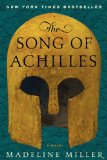Book Club Discussion Questions
In a book club? Subscribe to our Book Club Newsletter!
For supplemental discussion material see our Beyond the Book article, The Evolution of Achilles and our BookBrowse Review of The Song of Achilles.
Please be aware that this discussion guide will contain spoilers!
- In the Iliad, Patroclus is a relatively minor character. Why do you think the author chose him to be her narrator? Which other figures in the story might make interesting narrators?
- Near the beginning of their friendship, Achilles tells his father that he values Patroclus because "he is surprising." What do you think Achilles means by that? How is Patroclus different from the other foster boys? Why?
- What do you think are the reasons behind Thetis' opposition to Patroclus?
- How do the boys change during their time with Chiron? Do the centaur's lessons continue to be a guiding force in their lives?
- On the island of Scyros, what motivates Deidameia's desire to speak to Patroclus alone? What does she hope to achieve?
- To what extent does Achilles' ultimate destiny shape his choices? Is there such a thing as free will in this world?
- Historical events can sometimes turn upon the will or personality of a single person. Aside from Achilles, are there other characters whose faults or virtues significantly affect the Trojan War's outcome?
- Myths are often called "timeless" for their insights into human behavior. What parallels do you see between the characters and conflicts of this novel and today? What pieces of Patroclus and Achilles' story can be universalized?
- What is the significance of song and music in the novel?
- Patroclus is often a self-critical narrator. Consider how other characters in the novel regard him - do they see him in the same way he sees himself?
- As represented in the novel, what are some of Odysseus' defining qualities? Do you find him a sympathetic character? Why or why not?
- Consider the explosive falling out between Achilles and Agamemnon. In what ways are each of them at fault for the rift? Could it have been avoided, or was it inevitable given that Achilles' fate is determined?
- Achilles and Briseis each claim Patroclus' loyalty and affection. In what ways are they similar or different? What are the dynamics of each of their relationships with Patroclus?
- What does the encounter between Priam and Achilles reveal about Achilles? Why do you think Achilles grants his request?
- Near the end of the book, Odysseus comes to speak to Pyrrhus on Patroclus' behalf. Why do you think he does this? How did it change (or not) your opinion of Odysseus?
- Peleus warns his son that any mortal who visits the sea-nymphs in their caves beneath the sea does not return the same. How is this belief borne out by the character of Pyrrhus, who was raised there? In what way does Pyrrhus confirm or deny Patroclus' fears about the gods?
- In the final pages of the book, we learn more about Thetis. How does this affect our view of her?
- Patroclus tells Thetis that he is "made of memories." What does he mean by that? What role does memory - both personal and cultural - play in the novel?
Unless otherwise stated, this discussion guide is reprinted with the permission of Ecco.
Any page references refer to a USA edition of the book, usually the trade paperback version, and may vary in other editions.
